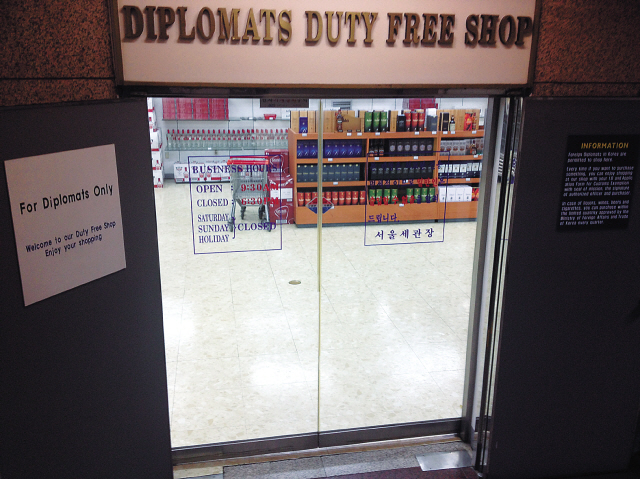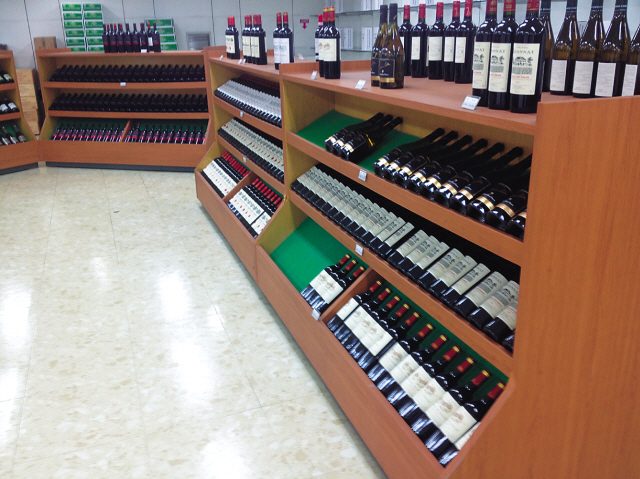 |
The front entrance of Korea’s Diplomatic Duty-Free Shop on the second floor of a building in southern Seoul on Tuesday displays a sign advising patrons that shopping here is for diplomats only. (Philip Iglauer/The Korea Herald) |
The dreary second-floor shop for foreign diplomats appeared as lonely as it was out of place amid the posh boutiques and upscale offices that populate southern Seoul.
Seoul’s drab and gray Diplomatic Duty-Free Store could be better suited in the black-and-white show reel of an old Soviet-era marketplace, or maybe in a grocery store in the North Korean capital city of Pyongyang than in one of this city’s most bustling, glitzy and fashionable shopping districts.
Kim Mi-yeon, a young female store clerk, said she sees but two or three customers a day at best: “They usually come in just to buy some wine.”
Apart from a few brands of whiskey and fewer brands of cigarettes, that is about all the store has on offer.
Well, that is not exactly true; an entire wall is dedicated to a single brand of paper towels standing on display from floor to ceiling like religious artifacts.
Kim said that the paper towels are what remain from when the store used to sell other items ― a by-gone era judging by the dust collecting on the towels’ packaging.
 |
Store shelves display rows of the same brand of liquor at Korea’s Diplomatic Duty-Free Shop which sells only two or three brands of whiskey, wine and cigarettes in southern Seoul on Tuesday. (Philip Iglauer/The Korea Herald) |
Shopping at diplomatic stores is a familiar part of the life of a Foreign Service officer. A diplomat can expect to find one at nearly every foreign posting in the world selling anything from groceries to office supplies to home appliances, and even high-end luxury items.
For many foreign diplomats posted in Korea, however, the diplomatic store in Seoul is underwhelming to say the least.
“For a city like Seoul where every mall and hotel has an attractive duty-free store targeting tourists, it is surprising to have such low-quality service for foreign diplomats,” said Israeli Ambassador to Korea Tuvia Israeli.
That reaction about Korea’s diplomatic store sums up the opinion widely held by other foreign envoys.
Seoul’s diplomatic store is in fact a frequent target of complaints among foreign envoys posted in Korea.
“I don’t smoke or drink alcohol, so why would I ever go there?” said one diplomat from a Middle Eastern country, ridiculing the store’s paltry selection.
One Muslim diplomat from a country outside the Middle East complained that it was difficult to find halal grocery items in Korea. Halal foods are those that are allowed under Islamic dietary guidelines set out in the Koran.
He said Korea’s diplomatic duty-free shop should accommodate envoys who are Muslim by offering such items in the interest of easing inconveniences faced by them and their families.
Since envoys cannot find what they need at the diplomatic shop here in Seoul, some turn to international catalogue sellers specializing in duty-free shopping for diplomats, such as Denmark-based Peter Justesen Company.
The Peter Justesen Company is one the oldest and largest of its kind, but orders can take as long as three months to arrive here, said an envoy from a Latin American diplomatic mission.
Diplomatic stores are “duty free” because foreign envoys are immune from paying customs duties and taxes for personal items they need to live and work in the host country.
The immunity is one of the protections they enjoy under the Vienna Convention on Diplomatic Relations.
This special privilege in turn created a cottage industry for service providers specializing in selling to diplomats. A simple Internet search turns up a number of online providers for diplomats.
An official from Seoul Customs House had an explanation for why Korea’s diplomatic store is so lackluster.
“The profit margins and the clientele are too small for most privately managed stores,” said Lee Sang-hyup, a manager at the Seoul Customs House, the agency charged with overseeing Korea’s diplomatic store.
He said that was also the reason the store focuses on high-tax and high-tariff items like liquor and cigarettes.
For example, a bottle of high-end 30-year-old scotch selling for $395 by online dealers was on sale at the diplomatic store for $275. But the margins for anything else simply are insufficient to sustain a business.
“It seems to me that the trend is for catalogue sellers to provide this service to diplomats all over the world,” Lee said. “This is what I saw when I was living in Thailand.”
After 16 years, the organization managing Korea’s diplomatic store, the Korea Veterans Welfare & Healthcare Corporation, is throwing in the towel.
The veterans’ organization plans to close the shop by the end of the year when the group moves its offices to Wonju, Gangwon Province, said Ko Byeong-hun, the store’s manager.
The meager profit margins do not justify keeping the shop open, Ko said.
The Seoul Customs House is consulting with the Ministry of Foreign Affairs and other government agencies on what to do in 2014 after the move, including whether to even operate an independent duty-free store for diplomats.
An option being discussed is handing the management of Korea’s diplomatic store over to one of the duty-free operators in downtown Seoul.
“We are reviewing what would be appropriate in the interest of the continued convenience of foreign diplomats here,” said Lee.
Lee declined to speculate whether that included selling halal food.
By Philip Iglauer (
ephilip2011@heraldcorp.com)









